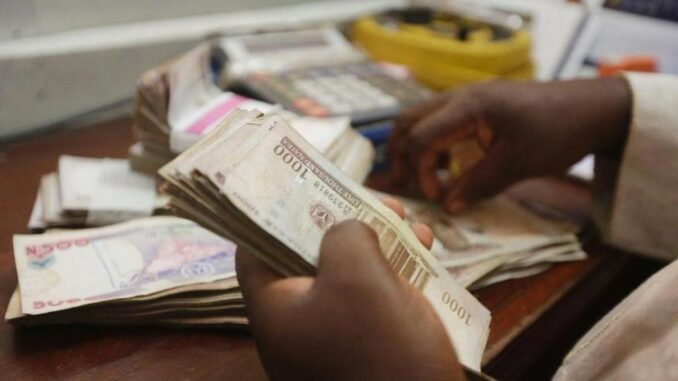
Rapid depreciation of the naira has outclassed the economic intelligence and electoral promises of the current administration as it did to its predecessors. But without a revamped strategy at the Central Bank of Nigeria (CBN), to gain a major foothold on the exchange rate through supply and demand, and elimination of political interference in the mix, the ripples of weaker naira on inflation are bound to be worse.
Indeed, issues relating to the appropriate exchange rate for the naira in relation to other currencies have remained topical over the years. Accordingly, the concern on the real value of the naira has elicited comments from scholars, multilateral institutions and other stakeholders including self-styled economic experts. Some of these claim to have a quick-fix solution to Nigeria’s economic problems as well as the way out of the exchange rate quagmire.
For example, in the prelude to the 2015 general elections, President Muhammadu Buhari, was widely reported to have said that, if voted into power, he would make the exchange rate one naira to one dollar – at a time when the naira exchanged at N197 to a dollar in the official market and slightly higher in the parallel market. When Buhari won the election, it became clear that talk is cheap. The narrative changed. Under his watch, the exchange rate of the naira worsened such that one needs as much as N420 to exchange for a dollar, in the official market and a whopping N570 in the parallel market to get one dollar. The chicken has come home to roost. The Buhari administration came face-to-face with the fact that there may not be a quick-fix solution to the determination of the naira-dollar exchange rate as it involves the formulation of appropriate supply and demand management policies. This recurring loss in value of the naira in relation to other currencies has been having significant implications on the purchasing power of the average Nigerian.
In its contribution to this issue of the value of the naira, the International Monetary Fund (IMF) in its recent report on the value of the naira in relation to other foreign currencies titled “Nigeria: Selected Issues Paper”, asserted that the naira has depreciated in value annually by as much as 10.6 per cent since 1973. In the report, the IMF indicated that the naira depreciation over the period is as much as 1.5 times worse than the currencies of other Emerging Market and Developing Economies (EMDE) including the economies of Sub Saharan Africa (SSA). It explained that this naira depreciation is inflation-inducing and the reason why inflation is higher in Nigeria than in these other economies.
This IMF report can be seen as an attempt to provide reasons for the already known stylised facts on the economic indicators of SSA and the EMDE. Exchange rates of many of the countries in the SSA are generally known to be volatile, a fact attested to by the IMF report. The degree of volatility of each country in the SSA and EMDE region has depended on the way their domestic economic situations are being managed ranging from their production, public finance and spending structures as well as their capacity to produce internationally tradable goods. The situation for Nigeria has been very poorly managed such that the major dependence of the economy on one single commodity, crude oil for its foreign exchange earnings, fiscal sustainability challenges and a poor operating environment, the local currency has been losing value relative to that of other countries in the region, in line with the IMF report.
Another interesting thing about the report is that the exchange rate pass-through effects on inflation in Nigeria, which is worse than what is applicable in most of the SSA and the EMDE. The exchange rate management challenges in Nigeria has been one of the factors fuelling inflation in Nigeria, which has driven high the cost-push effects on prices of commodities, against the general well-being of the ordinary Nigerian. Political interventions in the market for foreign exchange allocations or arbitrary interventions in the market is another key factor in determining the final value of the local currency vis-a-vis that of other currencies in the SSA and the EMDE.
Nigeria needs to arrest this trend of rapid depreciation of the naira. The economy cannot experience any meaningful growth if the issue of exchange rate supply and demand is not adequately addressed. The recent effort by the Central Bank of Nigeria through the Bankers Committee to unleash the RT200 FX programme to generate as much as $200 billion in foreign exchange repatriation inflows through the non-oil sector is quite commendable, at least in its conception. The problem is in the execution of the policy as the requirements placed on manufacturers in the realisation of the goal may be difficult to attain. That is an effort in addressing the supply side of the management of foreign exchange.
Efforts are also needed on the demand management side in relation to the promotion of Made-in-Nigeria goods, in the sourcing of raw materials by manufacturers as well as the elimination of political interference in the allocation of foreign exchange to eligible end-users. Except for these and many policies, options are adopted, the indicated rapid depreciation of the naira in the IMF report would continue as well as the negative effect on the rate of inflation. These would not be in the overall best interest of the wobbling Nigerian economy.


Be the first to comment